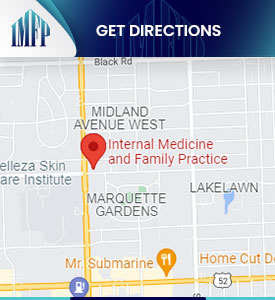Asthma and Bronchitis Treatment Specialist Q&A
No matter where you are in life, living with asthma can be a bothersome and challenging path to tread. If you require asthma treatment from trusted and professional doctors visit Dr. Wael Mctabi and Dr. Samiullah Choudry today at Internal Medicine and Family Practice. For more information, contact us or schedule an appointment online! We are conveniently located at 1719 Glenwood Ave Joliet, IL 60435. We welcome walk-ins!


Table of Contents:
How is asthma diagnosed?
What treatment options are there for asthma?
How long does it take to recover from bronchitis?
Can bronchitis turn into pneumonia?
What triggers bronchitis?
Breathing is such a fundamental function that, not only does it often go unnoticed, it is often taken for granted. This is not typically the case with people affected by asthma or bronchitis, as breathing may become more difficult or strained while living with either one of these conditions. Asthma is one of the most common chronic conditions in the world and is characterized by shortness of breath, difficulty breathing, and wheezing. Bronchitis, on the other hand, is a condition that occurs when the bronchi in the lungs become inflamed (hence the ‘-itis’ suffix). It is characterized by a dry cough and bronchospasm—spasms of the bronchial smooth muscle, resulting in the narrowing of the airways.
Diagnosing asthma is a fairly simple procedure. To diagnose asthma, a primary care physician or lung care specialist will discuss a patient’s medical history with them and perform a physical exam. A lung function test may be ordered in addition to other diagnostic tools, such as a chest or sinus X-ray. Individuals experiencing trouble breathing should never delay treatment. Come to Internal Medicine and Family Practice today to get started.
There are four distinct types of medicines and treatments for asthma:
• Quick-Relief Medicines — These medicines work quickly to relieve sudden symptoms or sporadic asthmatic triggers. They are taken as needed at the first sign of symptoms.
• Controller Medicines — By correcting the underlying changes in the airways—such as swelling and excess mucus—these medicines help control asthma. They can be either a single medicine or a combination of medicines.
• Combination of Quick-Relief And Controller Medicines — These medicines are used for both control and short-term relief. Please Note: These medicines are recommended in the current asthma clinical guidelines, however, they have not yet been FDA-approved to be used in this way.
• Biologics — This type of treatment targets a cell or protein to prevent swelling inside the airways and is given to people with certain types of persistent asthma. They are administered by injection or infusion.
The difference between asthma treatments can be confusing. It is important to understand what each treatment does and how it can help you manage your condition. Learning how to use each medicine correctly can help you keep your asthma well-controlled. Talk to our team about what asthma medicines are best for your unique situation.
Bronchitis can be either acute or chronic. Acute bronchitis typically lasts between 10 to 14 days, however, it is not uncommon for symptoms to last up to 3 weeks. Acute bronchitis can be the result of another illness, such as a cold or the flu, and it can also result from allergies.
Chronic bronchitis is a long-term form of COPD. Bronchitis is considered chronic when symptoms last for at least three months. Following recovery from the initial episode, subsequent episodes of bronchitis can come and go for two or more years.
Yes, bronchitis can develop into pneumonia. If left untreated, a bronchial infection can travel from the airways into the lungs, which may lead to pneumonia.
Common asthmatic bronchitis triggers include:
• Tobacco smoke
• Pollution
• Allergens, including mold, pet dander, dust, pollen, or food
If you have asthma or bronchitis or believe you might come to Internal Medicine and Family Practice for professional care. Our kind and compassionate professionals are experienced in treating both asthma and bronchitis and can help you breathe easily again. For more information, contact us or book an appointment online today! We are conveniently located at 1719 Glenwood Ave Joliet, IL 60435. We serve patients from Joliet IL, Plainfield IL, Lockport IL, Channahon IL, Romeoville IL, Manhattan IL and surrounding areas
Check Out Our 5 Star Reviews








